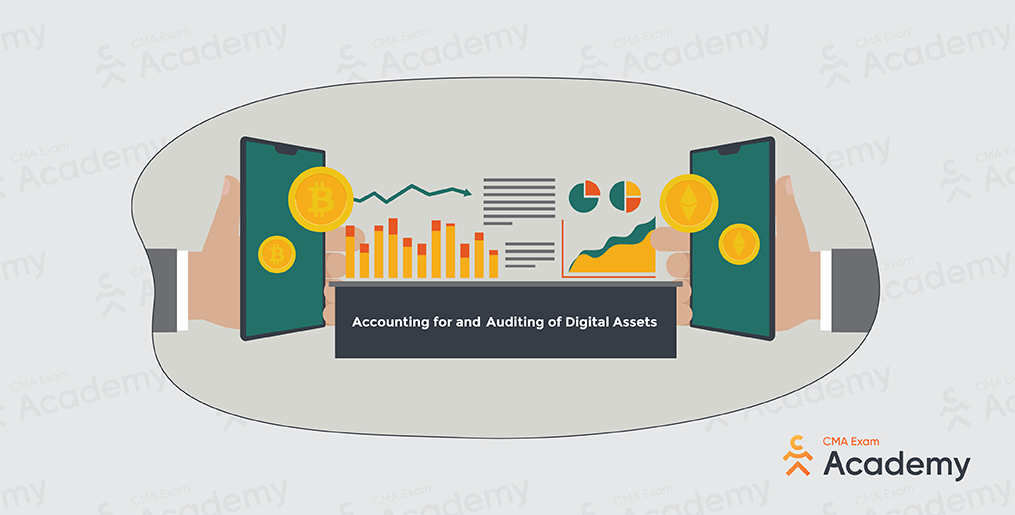Cryptocurrencies are everywhere: from the main players like Bitcoin and Ethereum to thousands of speculative tokens.
Corporations and business leaders worldwide are getting in on the action, and decentralized finance is something of a buzzword these days.
When it comes to accounting for cryptocurrency, every organization (from the Big 4 to local firms) is alert. The truth is, cryptocurrency has already impacted the world of accounting, and will continue to.
Certified Management Accountants (CMAs) are multi-skilled professionals. As a CMA, you’ll be expected to weigh in on accounting and finance as well as provide business leadership. To take up that mantle in earnest, you need to have cryptocurrency on your radar.
Let’s talk through what accountants need to know about cryptocurrency.
Are you still in the process of getting your CMA certification? Whether you’re studying for the test, clocking those required work hours, or actively looking for CMA jobs, the CMA Exam Academy has resources to help you out. Subscribe to our YouTube channel, follow us on social, and learn about the best CMA exam prep courses.
The Importance of Cryptocurrency Accounting (and Why CMAs Need to Learn About it)
There are a few ways in which cryptocurrency knowledge is going to become essential for all types of accountants.
Because crypto trading has become common, even among average investors, every accountant needs to know how these transactions affect individual and corporate taxes.
For CMAs, it’s even more important to understand the risks and uses of digital currencies on corporate balance sheets.
Working with businesses — Many companies across numerous industries (airlines, travel, entertainment, etc.) are working on the mechanics of accepting cryptocurrency payments. This means that crypto accounting will become part of bookkeeping, reconciliations, financial accounting, forecasting, and more.
Working with high net worth individuals — As a CMA, part of your firm’s book of business will likely include high net worth individuals. These are people who are ready and willing to invest (big or small) in the world of cryptocurrency. To keep their business, you’ll want to be a trusted partner who can guide them to make good investment decisions.
Market awareness and strategy — CMA jobs can be earned at the executive level, as controllers, CFOs, and more. To lead any firm or company into the future, you need a firm grasp on the dynamics of cryptocurrency in various markets.
As yet, the rules and regulations around cryptocurrency are unclear. We do know a few standards, and have a reasonable expectation for how various governing entities will handle crypto in the future. Let’s go through that.
US GAAP Rules for Cryptocurrency
When it comes to Generally Accepted Accounting Principles (GAAP) there are no hard and fast rules around crypto assets. These assets are classified as intangible assets, but certain central bank digital currencies (CBDCs) and some stablecoins won’t be accounted for that way.
A white paper from the AICPA titled Accounting for and auditing of digital assets details various dynamics around this, including the classification and measurement for entities purchasing crypto assets, recognition and initial measurements, subsequent accounting for digital assets, measurement of cost basis of digital assets, and more.
Initial practices are following standards for intangible asset classification, but it’s important that CMAs keep an eye on accounting for cryptocurrency, as it’s a fast-moving arena where things are subject to change.
IFRS Accounting Treatment for Cryptocurrency
Cryptocurrency accounting doesn’t neatly fit into the IFRS framework. In most cases, practices for IAS 38, Intangible Assets, either in cost or revaluation will be the standard to follow.
On the face of it, crypto does meet the criteria for IAS 38 nicely, considering that it is capable of being separated from the holder and doesn’t give the holder a right to fixed or determinable numbers of units.
Crypto tokens and cryptographic assets may be best treated under IFRS 9, classified as ‘Financial Instruments’ or financial assets.
How Should CMAs Handle Crypto in Treasury Planning?
Digital assets and digital currencies may enter the wheelhouse of corporate treasury managers.
If crypto is a likely part of the financial future of an organization, CMAs and other accountants need to learn how to handle crypto in treasury planning.
According to tradingplatforms.com, as of January 26 of this year, 27 publicly-listed companies in the U.S. held about $8 billion worth of bitcoin in their treasuries. Treasurers are the gatekeepers of a company’s holdings, which means they should focus first and foremost on security. Crypto as an asset class is still rife with risk, and there is inherent volatility in digital currencies.
Overwhelmingly, companies are making modest moves to acquire, and CMAs in charge of treasury planning should make every effort to be educated about the current state and possible future of crypto.
In 2020, the IMA launched a free course on Blockchain 101. The IMA and other leading authorities in the world of accounting regularly provide guidance on accounting for cryptocurrencies.
If you have questions about cryptocurrency accounting, submit them to be answered on our podcast, The CMA Show.
More Crypto Accounting Questions
There isn’t a single authoritative answer to the questions about how to do cryptocurrency accounting, and the regulations and standards will continue to evolve.
For now, we have some reasonable answers, but this is a high-growth area that is bound to shift in the coming months and years.
CMAs who specialize in cryptocurrency accounting may have an advantage, but there are still plenty of unknowns. The best thing you can do is stay in the loop, follow the news, watch what big firms are doing, and decide how you want to lean in.
Here are a few more answers to FAQs about crypto accounting:
Is cryptocurrency intangible property?
Cryptocurrencies aren’t physical assets and have an acquisition cost, which means they do meet the criteria for an intangible asset.
How is cryptocurrency taxed?
The IRS considers cryptocurrency as “property.” Transactions on cryptocurrency are taxable just like any other property acquisition or sale. They receive the same tax treatment as similar capital gains and losses, with tax liabilities in a given year applied to the proceeds from a sale.
How do accountants manage cryptocurrency bookkeeping?
Reconciliations related to cryptocurrency, and other bookkeeping tasks, should follow the guidelines set by regulatory bodies for asset classification, ie, intangible assets. Cryptocurrency bookkeeping should record transactions at point of sale or trade, and accurately report gains vs. losses on tax returns.
Is cryptocurrency an asset?
Digital currencies, cryptocurrencies, are a type of digital asset. It is an intangible asset, as there is no physical version of a crypto token. Some analysts think that crypto could become its own asset class in the coming years, but that remains to be seen.
Have more questions? Drop them below and I’ll weigh in!
Resources
As you do your best to stay in the know about accounting for cryptocurrency, here are the best resources to check out:
- Virtual Currencies page from the Internal Revenue Service
- Accounting for and auditing of digital assets practice aid from AICPA
- Blockchain 101 by IMA
- Evolving Cryptocurrency Framework from BDO Insights
- Cryptocurrency accounting resources from The CPA Journal

Hi, I’m Nathan Liao (aka the CMA Coach)! For the last 10 years, over 82,000 accounting and finance pros came knocking at my door seeking guidance and help. If you’re also aiming to conquer the CMA exam on your very first try—without wasting away time or money—you’ve found your ultimate guide. Dive in deeper to discover more about me and the dedicated team that powers CMA Exam Academy. Click here and let’s embark on this journey together!








